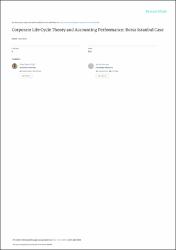| dc.contributor.author | Güleç, Ömer Faruk | |
| dc.contributor.author | Karacaer, Semra | |
| dc.date | 2019-07-01 | |
| dc.date.accessioned | 2019-07-02T06:41:52Z | |
| dc.date.available | 2019-07-02T06:41:52Z | |
| dc.date.issued | 2018-04-30 | |
| dc.identifier.citation | Güleç, Ö. F. & Karacaer, S. (2018). Corporate Life Cycle Theory and Accounting Performance: Borsa Istanbul Case. Muhasebe ve Finansman Dergisi, 78, 265-279 | |
| dc.identifier.issn | 2146-3042 | |
| dc.identifier.uri | https://hdl.handle.net/20.500.11857/982 | |
| dc.description.abstract | This study examines the association between accounting performance measures and stock returns with the corporate life cycle theory. Corporate life cycle stages which are derived from the product life cycle are the results from changes in the strategic activities of the firms. We use Anthony and Ramesh (1992) value relevance model to test whether the stock market responses to three accounting measures (sales growth, capital expenditures, and earnings) are the functions of life cycle concept. We choose 153 nonfinancial firms that operate on Borsa Istanbul for the years between 2006 and 2014 for the analyses. According to the results, three accounting performance measures that are unexpected sales growth, unexpected capital expenditures, and unexpected earnings are most (least) highly valued in growth (decline) stage. In addition, while technology and communication industries at the growth stage, metal industry, cement and glass products industry are at the decline stage | |
| dc.description.abstract | Bu çalışma, muhasebe performansı ölçümleri ile hisse senedi getirileri arasındaki ilişkiyi kurumsal yaşam döngüsü teorisi ile birlikte incelemektedir. Ürün yaşam eğrisinden türetilen kurumsal yaşam eğrisi evreleri, firmaların stratejik faaliyetlerinde meydana gelen değişimlerin sonucudur. Üç muhasebe ölçümüne (satış büyüme hızı, sermaye harcamaları ve kazançlar) hisse senedi piyasasalarının tepkisinin yaşam eğrisi kavramının bir fonksiyonu olup olmadığını test etmek amacıyla Anthony and Ramesh (1992) değer ilişkisi modeli kullanılmıştır. Analizler için 2006 ve 2014 yılları arasında Borsa İstanbul’da faaliyet gösteren 153 finansal olmayan işletme seçilmiştir. Çalışmanın sonuçlarına göre, üç muhasebe performans ölçümü olan beklenmeyen satış büyüme hızı, sermaye harcamaları ve kazançlar büyüme (düşüş) evresinde en yüksek (düşük) değer ilişkisine sahiptir. Buna ek olarak, teknoloji ve ulaştırma sektörleri büyüme evresinde yer alırken, metal sanayi, çimento ve cam ürünleri sektörleri düşüş evresinde yer almaktadır. | |
| dc.language.iso | eng | |
| dc.relation.ispartof | Muhasebe ve Finansman Dergisi | |
| dc.rights | info:eu-repo/semantics/openAccess | |
| dc.subject | Corporate Life Cycle | |
| dc.subject | Accounting Performance | |
| dc.subject | Stock Returns | |
| dc.subject | Value Relevance | |
| dc.subject | Kurumsal Yaşam Eğrisi | |
| dc.subject | Muhasebe Performansı | |
| dc.subject | Hisse Senedi Getirileri | |
| dc.subject | Değer İlişkisi | |
| dc.title | Corporate Life Cycle Theory and Accounting Performance: Borsa Istanbul Case | |
| dc.title.alternative | Kurumsal Yaşam Eğrisi ve Muhasebe Performansı: Borsa İstanbul Örneği | |
| dc.type | article | |
| dc.authorid | 0000-0002-8890-1140 | |
| dc.department | Fakülteler, İktisadi ve İdari Bilimler Fakültesi, İşletme Bölümü | |
| dc.relation.publicationcategory | Makale - Ulusal Hakemli Dergi - Kurum Öğretim Elemanı | |



















